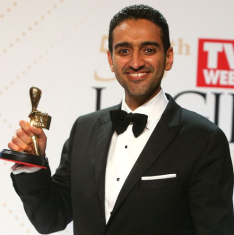Waleed Aly: Journalism isn’t really a profession and clickbait is costing us our authority
Commentator Waleed Aly has warned that journalism faces losing its authority with the public if competition continues to drive publications into the world of clickbait.
The host of Ten’s The Project, who earlier this year won the Gold Logie as most popular TV personality, gave the Andrew Olle Media Lecture in Sydney last night.

In the speech, Aly spoke of how commercial pressures and digital disruption have led to an increasingly lightweight news cycle which has in turn hurt the public’s trust in the trade of journalism. He said:


First thing I’ve completely agreed with him on. Well done, Waleed. Great lecture.
Pretty rich coming from someone who hosts the TV equivalent of clickbait.
All the old lawyer jokes now apply to journalists. Very few remain with ethics (You all know when you are producing a story that is untruthful due to a minority complainant lacking credibility) and half the stories are first world problems like “My chicken was uncooked when I went to xxx”. With no consideration for the impact that story has on the people at xxx.
Good lecture. And Waseed was previously someone (almost the only one) who I found to be an incisive and talented “serious” journalist on the radio. I heard he’d gone to The Project – I confess I didn’t know what that was. I sought it [the project] and it was superficial, dumbed down – what clickbait is supposed to be. I don’t begrudge Waleed the money. I do miss him.
When you put the needs of the advertiser before that of the reader/viewer this is what happens. News is now just a vehicle for selling advertising, it has no more worth than that. It won’t be long before advertisers realise they can make the news themselves and bypass the very expensive process of buying advertising on channels that have little worth to the reader/viewer.
A real shame.
Given that right now you can go to The Age’s homepage and click on what looks like a lead news story – only to find it actually takes you to a blog type puff piece over at Huff Post (and it doesn’t even open in a new tab, as any link to an external site should!), I’d say Aly’s comments are spot on.
Without doubt, Waleed Aly is the smartest bloke in the room in Australian media at the moment. He delivered some serious home truths in this speech, none moreso than to point out the fact that journalism is not a profession, and in its current incarnation, never will be.
Interesting that he took up the theme of journalism not being a profession but only in a remarkably gentle way. Mentioning the code of ethics and the lack of a deregistration function.
What really strikes me as the killing blow to journalism as a profession is the declining standards of practice. In the professions a doctor, lawyer, nurse, social worker, psychologist etc is actually expected to get better each year as part of their standards. Journalism is worse in 2016 than it was in 2015, it will be worse still in 2017. That’s considered normal in journalism….doing a worse job each year. That’s really what stops it from being seen as a profession.
Are you saying at all journalism is worse or just the stuff you don’t like? Just as all doctors nurses and lawyers improve year on year? I think I’d have to disagree with both of those statements…journalism isn’t all bad …exposing Trump, the European refugee crises, at home the mistreatment of youths in custody in NT, ongoing stories on refugees in Australia, abuses in greyhound training etc etc…don’t just listen to Bolt et al…read some of the good journos as well.
There will always be exceptions but the macro trend is for lower standards year on year. As I am the Walrus notes below, the supporting model is not longer fit for purpose.
There’s been a long slow decline in standards but we’re well past the event horizon now. Trust with the audience was lost, and with it, the audience’s willingness to pay. Which leads to more clickbait, less trust, less sales, which leads to more clickbait, less trust, less sales….which leads to….I think the point has been made.
Yes, journalistic standards are unquestionably deteriorating year-on-year. And for a very simple reason…the commercial model supporting it is teetering on the edge
Well I think we have Mr R Murdoch to thank for killing journalism. Nobody has done more in the race to the bottom of the barrel than Rupert.
The same homogeneity is happening in convenience stores.
When I go to the shop, I want to be able to choose between peppermints, not be forced to eat Mentos. Some days I want a XXX mint, sometimes I feel like Lifesavers and on rare days, a bag of Oddfellows. #Istand4mintdiversity